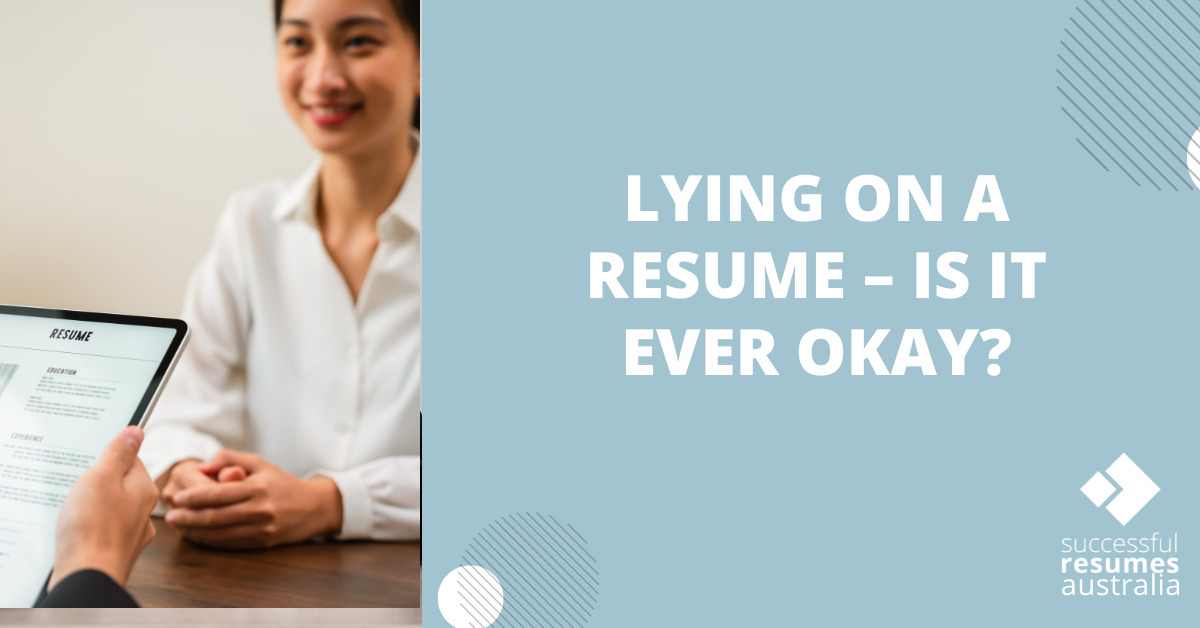
Lying on a resume – is it ever okay?
Everyone does it, right? But is lying on your resume ever okay?
Checkster, a reference checking company based in the US, recently surveyed more than 400 job applicants as well as 400 hiring managers, recruiters and other human resources professionals about lying on resumes and the results were pretty astounding. The survey found that 78% of job seekers admitted they did or would consider misrepresenting themselves on their job application. This backs up a study done be CareerBuilder that also suggested 75% of employers have caught a lie on a resume.
In Australia, the figures are estimated to be a different but no less alarming. The Independent Commission Against Corruption (ICAC) has conservatively estimated that 25 per cent of job seekers have inaccuracies on their curriculum vitae.
There’s a variety of things people lie about on their resume, but education and qualifications are the most common. Next on the list were dates of employment, position titles and overstating experience or skill levels. So, is it acceptable to lie about any of these elements, and what are the associated risks?
Qualifications
The qualifications you’ve earned are often a key element of being hired for a particular job and this is especially the case if the qualification is a formal one such as a trade, TAFE or University. All qualifications issue a certificate of completion, and for the most part these include dates of attendance and a copy of your results. Some employers will ask for evidence that you’ve completed a qualification and if you’ve lied, you’ll certainly have some serious explaining to do if not worse.
In the UK, an employee claiming to have two PhDs and a master’s degree, but only really had a higher education diploma in social work and a teaching qualification, was jailed for two years when his deception was discovered.
Governments are now beginning to crack down on resume fraud. In Western Australia, state governments can now fine CEO applicants up to $5000. If these applicants provide false or misleading information during their application process, they will be charged.
Veronica Theriault, who was appointed as the head of IT in South Australia’s Department of Premier and Cabinet, was arrested in 2017 after lies were discovered in her CV. She was fired from her $270,000 p.a. gig for writing a fictitious 20-year work history as a tech executive and claiming fake university degrees. Daringly, she has also used a headshot of actress Kate Upton as her LinkedIn photo instead of her own.
Experience
The survey of jobseekers found it was common for people to adjust the length of time they’ve worked for a company so they can fill gaps in their resume or remove entire jobs. This is particularly common for people who have jumped around often. Removing one or two roles give the appearance of more stability than they have actually had. Oddly, anecdotal evidence found people have also changed the name of a company and even invented companies!
Department store Myer sacked its General Manager, Strategic and Business Development, when they found out he lied on his resume. The employee Andrew Flanagan, claimed he had worked in jobs with salaries between $140,000 and $350,000 before landing the $400,000 role with Myer. He had convinced acquaintances to be fake referees who lied to confirm his fake job history. Flanagan’s weave of deception was discovered on his first day when Myer publicly announced his appointment and an old “employer” contacted the retailer to deny he had worked for them.
With information so readily available online these days, lies of this sort will soon unravel. A quick search online will show the name of companies, the dates of their existence and other associated information. If an employer is curious, or suspicious about any experiences listed on your resume, they can ask for a reference. If you can’t provide one, you’ll need a very good reason why. LinkedIn also improves the transparency of candidate’s careers. If you have listed a role, it is even easier for a recruiter or hiring manager to reach out and confirm your employment with the company.
The only acceptable lie as far as most employers are concerned, is perhaps a slight blur of working dates. Perhaps you can’t quite remember whether you started a job in January or February back in 2010, or if you resigned at Christmas or in the New Year for example. So long as you’re not covering up any misdemeanor, you’ll probably get away with slight blurring of dates, although we don’t recommend it.
Skills
When CareerBuilder did their study of more than 1,100 hiring managers and human resource professionals, The HR managers shared their most memorable and cringe-worthy examples of real-life gaffes found on actual resumes. One of them was an applicant who applied for a job that they were vastly unqualified for. Only in this instance, the candidate didn’t pretend to have the skills for the job. But as it turns out many do. According to Monster’s 2019 State of the Recruiter survey, 85% of recruiters said that candidates exaggerate skills and competencies on their resumes.
It’s important to know that if you lie on a resume about having skills that are integral for the job, your employer can terminate you. If you are hired for a data entry role, but when you start they realise you dont know how to use Microsoft Excel, you can and likely will be, fired.
Salary
You won’t need to print the amount of money that you’ve earned on your resume, but it may come up in conversation during the interview process. You might be tempted to add a few thousand dollars here or there, but employers are savvy, and companies are usually aware of industry averages for particular jobs. If you over-state your previous salary it may ring alarm bells, and this type of information can be validated during the reference checking process anyway.
If you’re in need of a new resume, or would like assistance with reworking an existing resume, we’d love to help! Contact a team member closest to you.



